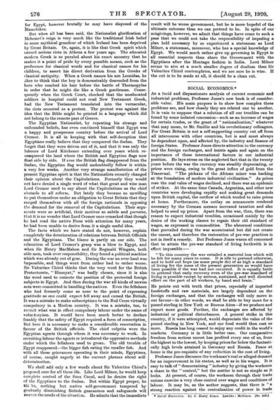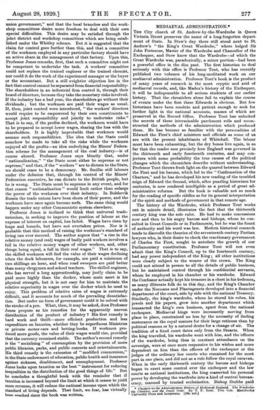SOCIAL ECONOMICS.*
As a lucid and dispassionate analysis of current economic and industrial problems, Professor Jones's new book is of consider- able value. His main purpose is to show how complex these problems are, and how closely they are related one to another. It is vain to suppose that a solution of all our troubles can be found by some isolated concession—such as an increase of wages for certain trades, or the grant of " nationalization," whatever that may mean, to Mr. Smillie and his revolutionary colleagues. For Great Britain is not a self-supporting country cut off from all intercourse with other countries, but is and must always be dependent upon, and affected by, the industry and finance of foreign States. Professor Jones directs attention to the currency and the foreign exchanges, and insists again and again on the importance of these international factors in our industrial position. He lays stress on the neglected fact that in the twenty years before the war the currency was steadily depreciating, or prices were rising, owing to the great influx of gold from the Transvaal. " The pickaxe of the African miner was hacking at the foundation of modern industrial civilization." As prices rose the real value of wages declined, and there was an epidemic of strikes. At the same time Canada, Argentina, and other new countries were developing rapidly and making great demands upon British capital, the outflow of which tended to raise prices at home. Furthermore, the outlay on armaments rendered necessary by the German menace increased taxation and also helped to send up prices. Apart from the war, then, there was reason to expect industrial troubles, occasioned mainly by the desire of the working classes to regain their old standard of wages, as expressed in commodities. The abnormal conditions that prevailed during the war accentuated but did not create the unrest, and therefore the restoration of pre-war practices is not in itself a remedy. But Professor Jones warns all concerned that to attain the pre-war standard of living forthwith is in effect impossible :— " To this country the war entailed a material loss which will be felt for many years to come. It is idle to pretend otherwise, and to hold out hope (as some people do) of as high a standard of living for the mass of the present generation as would have been possible if the war had not. occurred. It is equally futile to pretend that early recovery even of the pre-war standard of living is possible except by serious, sustained, and well directed effort on the part of all workers, by hand and brain."
He points out with truth that prices, especially of imported foodstuffs and raw materials, are largely dependent on the foreign exchanges, and that the exchanges will only move in our favour—in other words, we shall be able to buy more for a pound sterling in New York or Buenos Aires—if we produce and export more goods. Further, the exchanges are affected by industrial or political disturbances. A general strike in this country, if it were attempted, would depreciate the value of the pound sterling in New York, and our food would then cost us more. Russia has long ceased to enjoy any credit in the world's markets. Germany is in little better case. Our comparative freedom from serious unrest has profited every one of us, from the highest to the lowest, by keeping prices far below the fantasti- cally high levels attained in Germany and Russia. Peace at home is the pre-requisite of any reduction in the cost of living.
Professor Jones discusses the workman's real or alleged demand for an improvement in his status, as well as in his wages. It is easy to talk of " democratising " industry by giving the workmen a share in the " control," but the matter is not so simple as it looks. At present, of course, the workmen through their trade unions exercise a very close control over wages and conditions of labour. It may be, as the author suggests, that there is " a strong reaction against the centralisation of power in trade • Social Economics. by J. Harry Jones. London : Methuen. Ns. not.)
union government," and that the local branches and the work- shop committees desire more freedom to deal with their own special difficulties. This desire may be satisfied through the joint district and workshop committees which are being estab- lished under the Whitley scheme. But it is suggested that the claim for control goes further than this, and that a committee of the workmen employed in any particular factory should have an active share in the management of that factory. Upon this, Professor Jones remarks, first, that such a committee might not be competent to undertake the task. A workers' committee could not replace the trained engineer or the trained chemist, nor could it do the work of the experienced manager or the buyer or the accountant. But a still weightier objection lies in the fact that control cannot be separated from financial responsibility. The shareholders in an industrial firm control it, through their board of directors, because they take the monetary risks involved. If the industry has a bad year, the shareholders go without their dividends ; but the workmen are paid their wages as usual. If, then, joint control were introduced, " the workers' directors would require to be empowered by their own constituents to accept joint responsibility and jointly to undertake risks." That is to say, if the profits declined, the workmen would have to be prepared to accept lower wages, sharing the loss with the shareholders. It is highly improbable that workmen would assume such responsibilities. The idea that the State could somehow be made to take all the risks while the workmen enjoyed all the profits—an idea underlying the Miners' Federa- tion scheme for the management of the coal industry—is of course absurd. Professor Jones says bluntly that, under " nationalization," " the State must either be supreme or not supreme," and that, if the " workers " are to dictate to the State, we should cease to be a democracy. Mr. Smillie still labours under the delusion that, through his control of the Miners' Federation executive, he can dictate to the British people, but he is wrong. The State must be supreme in any event, and for that reason " nationalization " would limit rather than enlarge the power of the workmen over their industry. In Bolshevik Russia the trade unions have been shorn of their power, and the workmen have once again become serfs. The same thing would happen under any other Communistic system elsewhere.
Professor Jones is inclined to think that universal trade- unionism, in seeking to improve the position of labour at the expense of interest on capital, has failed. Wages have risen by leaps and bounds, but have not overtaken prices. Nor is it probable that this method of raising the workman's standard of living can ever succeed. The author argues that " a rise in the relative money (and real) wages of badly paid workers involves a fall in the relative money wages of other workers, and, other things being equal, a fall in their real wages." That is to say, the skilled workmen will find the value of their wages declining when the dock labourers, for example, are paid a minimum of two shillings an hour, and when road sweepers are paid better than many clergymen and school teachers. The skilled engineer, who has served a long apprenticeship, may justly claim to be paid more highly than the docker, whose main asset is his physical strength, but it is not easy for him to maintain the relative superiority in wages over the docker which he used to enjoy. This problem of relative rates of wages is extremely difficult, and it accounts for much of the prevailing dissatisfac- tion. But under no form of government could it be solved with the stroke of a pen. What, then, it may be asked, does Professor Jones propose as his remedies for the apparently uneven distribution of the product of industry ? His first remedy is hard work and thrift—more efficient production and less expenditure on luxuries, whether they be superfluous Ministries or private motor-cars and betting-books. If workmen pro- duced more goods, the value of their wages would rise, provided that the currency remained stable. The author's second remedy is the " socialising " of consumption by the provision of more public libraries, parks, and public concerts and entertainments.
His third remedy is the extension of " modified communism," in the State endowment of education, public health and insurance against sickness, disablement, and unemployment. Professor Jones looks upon taxation as the best " instrument for reducing inequalities in the distribution of the good things of life." But he concludes a thoughtful book with the reminder that if taxation is increased beyond the limit at which it ceases to yield more revenue, it will reduce the national income upon which the standard of living depends. That limit, we fear, has virtually been reached since the book was written.



































 Previous page
Previous page